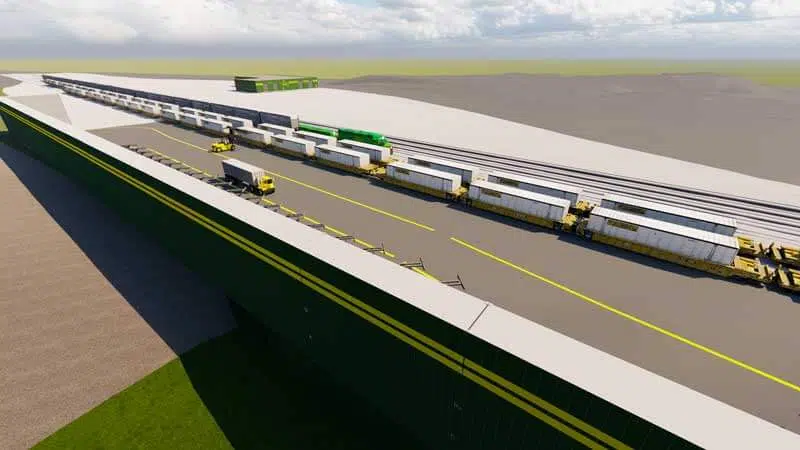
An artist rendering of the proposed Lancaster Logistics Park in west Saint John. (Image: www.lancasterlogisticspark.ca)
After a three-hour public hearing Monday night, Common Council still had many unanswered questions about a proposal to rezone J.D. Irving, Limited’s Dever Road railyard.
The proposed rezoning would allow the company to develop an intermodal terminal to transfer containers between rail cars to tractor-trailer chassis, and eventually an auto terminal designed to receive new vehicle shipments by rail.
Councillors eventually approved the first two readings of the rezoning, but following a marathon hearing where many questions were unable to be answered due to time constraints or process complexities, council has asked for more investigation into the possible noise effects of the proposed Lancaster Logistics Park.
“The work that’s left to be done, to come back to you prior to third reading to address what we have clearly heard this evening: that there are still some unanswered questions, and some outstanding issues among councillors on the entire noise issue, be it enforcement, be it monitoring, be it who pays, etc.,” said City Manager John Collin.
City staff will now research some of council’s remaining questions and present the answers before third reading.
PAC Members Change Tune
At an earlier Planning Advisory Committee (PAC) meeting, nine nearby residents voiced concerns about noise and traffic as a result of the railway expansion, though the committee unanimously approved the plan pending five conditions and assurances from JDI that there would be no additional noise.
One of those conditions from PAC would have required JDI to complete a 240-metre long and 10-metre high sound wall before the construction of the logistics park begins.
But after the PAC vote, city staff rescinded the requirement to pre-build the sound wall, saying it would interfere with preparing the construction site and instead recommended to council that the sound wall be built before operations begin at the facility.
Committee chair Alex Weaver-Crawford said once PAC members learned the sound wall would not go up prior to construction, at least one member said they would have changed their vote.
“We heard all this information after the recommendations were made … and the unanimous vote [by PAC] really does reflect the recommendations prior to them being changed [by city staff],” Weaver-Crawford said.
“Not knowing more details about this noise-monitoring program has made some committee members note that they may actually have changed their vote had they known about this prior.”
Weaver-Crawford told council that one member sought out city staff to try and formally rescind their approval. The board chair said she also may have voted differently “based on the current information.”
PAC member Anne McShane, who also joined the call, said she would have changed her vote as well with the removal of the condition requiring the pre-construction of the sound wall. The current proposal has left her with concerns about the noise and liveability impact for residents.
“For me, it was a noise mitigation issue in terms of ongoing monitoring and enforcement,” McShane said.
City staff recommended that the onus for sound monitoring and mitigation be placed on the proponent and not the city itself.
They proposed a plan which would require the proponent to implement “appropriate noise mitigation measure(s)” should post-project noise levels indicate a greater than two-decibel change compared to pre-project levels.
Councillors Seek Answers
Many council questions Monday centered around the concerns residents had previously voiced.
Ian Simpson, general manager of NB Southern Railway, reiterated that the project wouldn’t impact noise, and would help decrease trucks causing wear and tear along west end streets.
“Over the course of the last 10 years, we’ve gone from zero to 400 fewer trucks, with 95 per cent of those coming off the west side streets and the pulp mill, and we’re looking to grow that business quite frankly,” he said.
“Which would be a hit against trucks, but a little more on the railways.”
However, due to time constraints built into the public hearing process, many councillors ran out of time before their questions were able to be answered.
As a result, Councillor Brent Harris added a motion calling for an amendment to the rezoning which would provide the city with the ability for long-term noise monitoring.
“We have their schedule, we know when these trains are being offloaded and coming,” Harris said.
“We surely can get it right, and set up the noise monitoring around that schedule to hit heavy traffic. We don’t have to have a month’s worth of data to be convoluted with a bunch of stuff happening a month down the road.”
Council voted to include the amendment at the close of the public hearing.
With files from Brad Perry.






